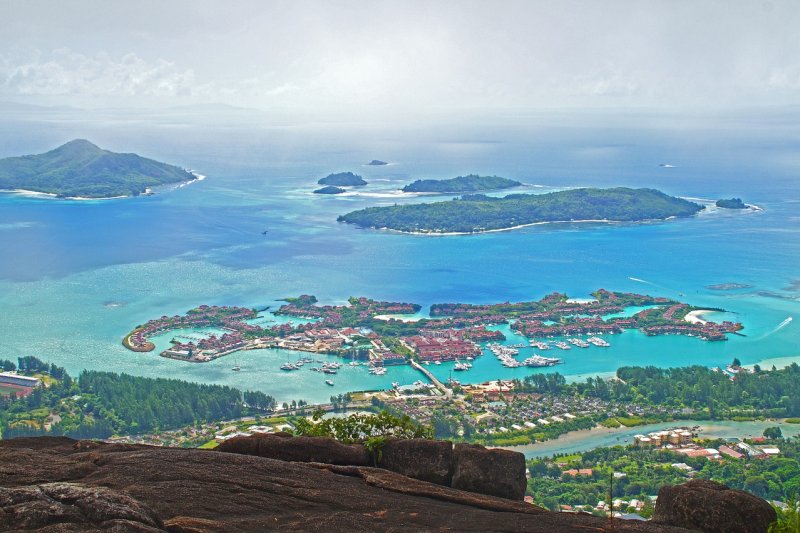For small island nations, marine plastic cleanup is prohibitively expensive

The cost of cleaning up plastic along the coasts of island nations like the Seychelles requires bigger, richer nations -- some of which are responsible for the pollution -- to contribute to the cause, researchers say. Photo by SCAPIN/Pixabay
Sept. 10 (UPI) -- Island nations like the Seychelles are uniquely vulnerable to the barrage of plastic pollution pouring into the world's oceans, and research published Thursday in the journal Scientific Reports suggests the cleanup bill is prohibitively expensive.
"The Indian Ocean is fringed with countries that have poor waste management infrastructure," lead researcher April Burt told UPI in an email.
"Other studies have shown that most of the marine plastic litter in the oceans is coming from ten rivers, the majority of which are in Asia," said Burt, an ecologist and graduate student at Oxford University in Britain.
Cleanup efforts on the Seychelles revealed an abundance of plastic shoes, mostly flip flops, as well as netting and line from commercial fishing operations.
To estimate the financial burden the barrage of plastic places on small island nations like the Seychelles, Burt and her research partners first calculated the effort to clean a small portion of the coast.
Scientists determined a 2019 cleanup, comprising 980 hours of work by 12 volunteers over the course of five weeks, cost a total of $224,538.
Next, researchers set out to estimate the total amount of plastic found strewn across Aldabra, the Seychelles' outer islands and the world's second-largest coral atoll.
Scientists determined a 2019 cleanup, comprising 980 hours of work by 12 volunteers over the course of five weeks, cost a total of $224,538.
Next, researchers set out to estimate the total amount of plastic found strewn across Aldabra, the Seychelles' outer islands and the world's second-largest coral atoll.
RELATED Plastic debris leaches toxins into the stomachs of sea birds
"We conducted a series of transects at 20 locations along the coast in each of the main coastal habitat types: beach, vegetation and limestone karst," Burt said. "For each transect we separated and weighed the litter found into six main categories and used this to extrapolate up to estimate total litter accumulated."
The six litter categories included: consumer plastic items, such as toothbrushes and cigarette lighters; plastic packaging material like plastic bottles; fishing-related items, such as buoys and netting; plastic footwear; small, unidentified plastic fragments; and other materials like glass.
"Our research shows that the main source was from the industrial tuna fisheries -- this industry exports tuna worldwide," Burt said.
"We conducted a series of transects at 20 locations along the coast in each of the main coastal habitat types: beach, vegetation and limestone karst," Burt said. "For each transect we separated and weighed the litter found into six main categories and used this to extrapolate up to estimate total litter accumulated."
The six litter categories included: consumer plastic items, such as toothbrushes and cigarette lighters; plastic packaging material like plastic bottles; fishing-related items, such as buoys and netting; plastic footwear; small, unidentified plastic fragments; and other materials like glass.
"Our research shows that the main source was from the industrial tuna fisheries -- this industry exports tuna worldwide," Burt said.
RELATED Autopsies show microplastics in all major human organs
When researchers added it all up, they determined it would require 18,000 hours of labor and cost $4.68 million to clean up all the plastic pollution found along the Aldabra coast.
Because much of the plastic pollution that makes its way to the shores of smaller island nations is coming from bigger, richer nations and extractive industries, the researchers suggest that wealthier countries help pay for the cleanup.
"We hope our findings will be used by local and regional governments to call out the need for international funding for dealing with the issue of marine plastic litter," Burt said.
Burt also said more must be done to ensure the commercial fishing industry can't continue to dump waste with impunity.
"The huge costs involved in removal are way beyond the financial capacity of local organizations and governments who are responsible for these island ecosystems," she said.
upi.com/7037059
When researchers added it all up, they determined it would require 18,000 hours of labor and cost $4.68 million to clean up all the plastic pollution found along the Aldabra coast.
Because much of the plastic pollution that makes its way to the shores of smaller island nations is coming from bigger, richer nations and extractive industries, the researchers suggest that wealthier countries help pay for the cleanup.
"We hope our findings will be used by local and regional governments to call out the need for international funding for dealing with the issue of marine plastic litter," Burt said.
Burt also said more must be done to ensure the commercial fishing industry can't continue to dump waste with impunity.
"The huge costs involved in removal are way beyond the financial capacity of local organizations and governments who are responsible for these island ecosystems," she said.
upi.com/7037059
No comments:
Post a Comment